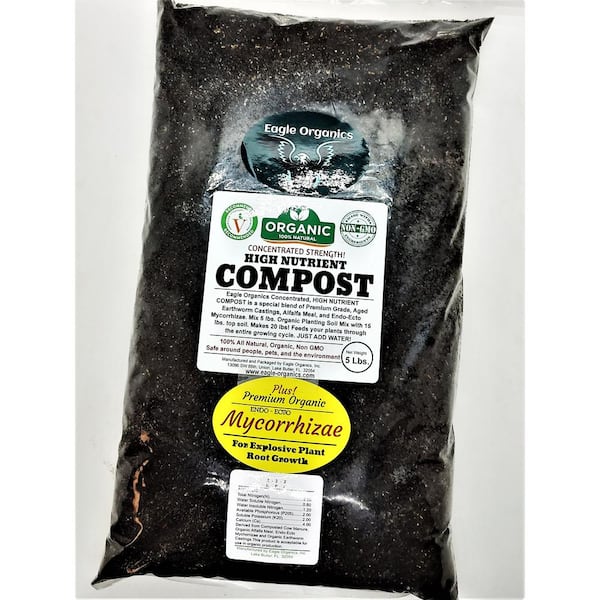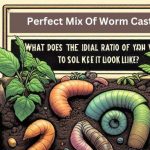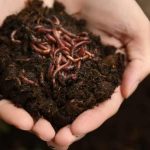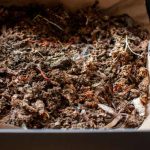Compost is the process of breaking down organic materials, while worm castings are the excrement produced by worms that feed on organic matter. Compost and worm castings are both organic materials used to enrich soil and improve plant growth.
Compost is created through the decomposition of organic matter such as food scraps, leaves, and grass clippings. It provides a wide range of nutrients and helps retain moisture in the soil. On the other hand, worm castings are the waste produced by earthworms that consume organic matter.
They are rich in beneficial microorganisms, enzymes, and nutrients, making them an excellent natural fertilizer. While both compost and worm castings can enhance soil fertility and plant health, worm castings are often more concentrated and have a higher nutrient content. Additionally, worm castings can improve soil structure and aeration.

What Is The Exact Process Of Composting?
Composting is a natural process where beneficial microorganisms break down organic matter. It involves the decomposition of various organic materials, such as kitchen scraps, yard waste, and leaves, to create nutrient-rich compost.
| Temperature | Aeration | Moisture | C:N Ratio |
|---|---|---|---|
| The carbon to nitrogen ratio affects decomposition rate. | Adequate airflow enhances microbial activity. | Proper moisture level promotes microbial growth. | C: N Ratio |
- Organic materials: Include kitchen waste, yard trimmings, and garden debris.
- Aeration: Ensure proper airflow to provide oxygen for composting organisms.
- Moisture: Maintain the right level of moisture to support microbial activity.
- Microorganisms: Beneficial bacteria and fungi break down organic matter.
- Time: Allow sufficient time for decomposition to occur, typically several months.
- Turning: Regularly turning the compost helps mix the materials and speed up the process.
Benefits Of Using Compost
Compost, a naturally occurring organic material, provides numerous benefits when added to soil.
Firstly, it enriches the soil with essential nutrients, promoting overall plant health and growth. The decomposition of organic matter in compost releases important elements like nitrogen, phosphorus, and potassium, ensuring a well-balanced nutrient supply.
Secondly, compost improves soil structure and fertility by enhancing its ability to retain moisture and oxygen. It helps to break up heavy clay soils, allowing for better root penetration and preventing waterlogging.
Additionally, compost acts as a natural binder, improving the aggregation of soil particles and ensuring a crumbly and friable texture.
Finally, compost enhances water and nutrient retention, reducing the need for frequent irrigation and preventing nutrient leaching.
This results in healthier plants with stronger root systems and increased resistance to drought and disease.
What is Worm Casting and Secrets Of Vermiculture?
The world of composting offers various options to transform organic waste into nutrient-rich matter for your plants. One such option is worm castings, which are produced through the process of vermicomposting.
Vermiculture, the practice of cultivating worms to break down organic material, is gaining popularity among garden enthusiasts. These tiny heroes, specifically chosen species for backyard vermicomposting, are capable of converting organic waste into a highly fertile substance known as worm castings.
The selection of worms for vermicomposting is crucial. Red worms or Eisenia fetida are often preferred due to their ability to consume large amounts of organic waste quickly. Creating a suitable habitat for these diligent workers is essential for productive worm composting.
Providing a well-ventilated container with a bedding material composed of shredded newspaper or coconut coir creates a perfect environment for these worms to thrive.
Ensuring an optimal temperature range, and moisture content, and avoiding certain food types are keys to successful vermicomposting.

Advantages Of Worm Castings
The use of worm castings as a fertilizer offers several advantages over traditional compost. One major benefit is that worm castings are nutrient-rich, providing plants with essential elements for growth. They contain high levels of nitrogen, phosphorus, and potassium, as well as other trace minerals that are vital for plant development.
In addition, worm castings improve soil aeration and drainage. The tiny granules created by worms help loosen compacted soil, allowing roots to penetrate more easily. This enhanced soil structure also allows for better water absorption and reduces the risk of waterlogging.
Furthermore, worm castings can suppress plant diseases and pests. They contain beneficial microorganisms that help fight off harmful pathogens, promoting plant health and reducing the need for chemical pesticides.
Overall, the use of worm castings as an organic fertilizer provides numerous advantages for gardeners and farmers, contributing to healthier plants and more sustainable agriculture practices.
How are Nutrient Content And Composition Different From Compost vs. Worm Castings?
| Compost | Worm Castings | |
|---|---|---|
| Nutrient Content | Compost contains a wide range of macronutrients and micronutrients including nitrogen, phosphorus, potassium, calcium, magnesium, and sulfur. | Worm castings have higher levels of available nutrients compared to compost. They are rich in essential plant nutrients like nitrogen, phosphorus, potassium, calcium, magnesium, and trace elements. |
| Composition | Compost is a result of the controlled decomposition of organic materials such as food scraps, yard waste, and manure through microbial activity. | Worm castings, also known as vermicompost, are produced through the digestion and breakdown of organic matter by earthworms, resulting in nutrient-rich excrement. |
| Differences in organic matter content and decomposition stage | Compost usually contains a mixture of various organic materials at different stages of decomposition. It can include plant matter, animal waste, and other organic scraps. | Worm castings are a highly concentrated form of organic matter as they consist of worm excrement that has undergone further decomposition. As a result, worm castings have a higher organic matter content compared to compost. |
What Affects Soil Structure And Moisture Retention Most?
Compost and worm castings both contribute to improving soil structure and moisture retention. Soil aggregation and crumb structure are impacted by the addition of compost and worm castings. Compost contains a mixture of organic materials, such as decomposed plant matter, while worm castings are the rich organic matter produced by worms.
The addition of compost and worm castings to the soil helps to create a favorable environment for soil microorganisms, which play a crucial role in soil aggregation. These microorganisms break down organic matter, releasing nutrients and creating stable soil aggregates.
Soil aggregates contribute to the crumb structure of the soil, creating pore spaces for air, water, and roots to penetrate. This improves water infiltration and drainage, preventing waterlogging and enhancing moisture retention in the soil.
When it comes to measuring water-holding capacity, compost and worm castings can both increase the soil’s ability to hold moisture. They act as sponges, absorbing and retaining water, making it available for plant uptake.
In conclusion, both compost and worm castings positively impact soil structure and moisture retention, contributing to overall soil health and fertility.

Microbial Activity And Plant Growth
Microbial activity is a key component of both compost and worm castings, playing a vital role in plant growth and development. Both compost and worm castings are rich in beneficial microorganisms, which contribute to the overall health of plants.
In compost, beneficial bacteria, fungi, and other microorganisms break down organic matter, releasing essential nutrients that plants can readily absorb. These microorganisms also help to suppress harmful pathogens, promoting a healthier soil environment for plants to thrive.
Similarly, worm castings are teeming with beneficial microbes, including bacteria, fungi, and protozoa. These microorganisms contribute to the breakdown of organic matter, making nutrients more available to plants. Additionally, they help to improve soil structure, enhance water retention, and suppress plant diseases.
The presence of these beneficial microorganisms in both compost and worm castings is what sets them apart from traditional fertilizers. By supporting a diverse microbial community, compost and worm castings provide multiple benefits for plant growth and development, resulting in healthier and more productive plants.
How You Can Use Compost In Gardening And Landscaping?
Compost and worm castings are both valuable organic materials that can be used to improve soil health in gardening and landscaping. Compost is produced through the decomposition of organic matter, while worm castings are the nutrient-rich waste produced by worms during the vermicomposting process.
Both can be used as soil amendments, providing essential nutrients and improving soil structure.
There are various methods of incorporating compost into the soil, such as top dressing, mixing it into the soil, or using it as a mulch. The appropriate composting ratios will depend on the specific plants and applications.
For example, a general guideline is to use a 1:1 ratio of compost to soil when filling planting holes or preparing raised beds.
To maximize the benefits of compost, consider the following tips:
| Tip 1: Use mature compost that has been fully decomposed to avoid potentially damaging plant roots. |
| Tip 2: Apply compost regularly, as a single application may not provide long-term benefits. |
| Tip 3: Mix compost with other soil amendments, such as perlite or vermiculite, to improve soil drainage and aeration. |
| Tip 4: Consider making compost tea, a liquid fertilizer made from steeping compost in water, to further enhance nutrient availability. |
Harnessing Worm Castings For Plant Health
Applying worm castings as a top dressing or tea can greatly benefit plant health. Worm castings, also known as vermicompost, are a nutrient-rich organic fertilizer that can improve soil structure, enhance nutrient availability, and promote the growth of beneficial microorganisms.
When using worm castings as a top dressing, simply spread a thin layer on the soil surface around the base of plants. This helps to slowly release nutrients and improve moisture retention.
Alternatively, worm castings can be steeped in water to create a nutrient-rich tea. This can be used to water plants or applied as a foliar spray.
Calculating the correct amount for different plant needs
The correct amount of worm castings to use will depend on the specific needs of the plants being grown. It is generally recommended to apply worm castings at a rate of 10-20% by volume in potting mixes or garden soils.
When making worm-casting tea, dilute 1 part casting with 4 parts water. However, it’s important to note that worm castings are highly concentrated, so it’s best to start with a lower application rate and gradually increase if necessary. Regular monitoring of plant response will help determine the optimal amount for each specific plant type.
| Traditional gardening | Container gardening | Hydroponics |
|---|---|---|
| Worm castings can be incorporated into the soil before planting or applied as a top dressing. | Add worm castings to potting mixes or sprinkle a thin layer on the surface of containers. | Use o |
| Regular applications throughout the growing season can help improve soil fertility and overall plant health. | Regularly top dress containers or mix worm castings into the growing media to provide ongoing nutrition. | Worm castings provide essential nutrients and beneficial microorganisms for hydroponically grown plants. Warm water (77 F or 25 C) is ideal. |

Credit: www.homedepot.com
Frequently Asked Questions For Compost Vs Worm Castings
What Is The Main Difference Between Compost And Worm Castings?
Compost is a mixture of organic waste materials that decompose over time, while worm castings are the waste produced by worms after digesting organic matter. The main difference is that compost is a mix of various decomposed materials, whereas worm castings are a concentrated form of organic nutrients.
How Do Compost And Worm Castings Benefit Plants?
Both compost and worm castings improve soil health and provide essential nutrients for plant growth. Compost enriches the soil with organic matter, improving its structure and water-holding capacity. Worm castings, on the other hand, are rich in beneficial microorganisms and nutrients that enhance plant growth, increase yield, and boost disease resistance.
Can I Use Compost And Worm Castings Together?
Absolutely! Combining compost and worm castings can provide even greater benefits for your plants. The organic matter in compost helps improve soil structure, while the concentrated nutrients in worm castings enhance plant nutrient uptake. Together, they create a fertile growing environment that promotes healthy plant growth and vibrant blooms.
Conclusion
Overall, both compost and worm castings have their unique benefits in enhancing soil health and plant growth. While compost offers a broader range of nutrients and organic matter, worm castings provide concentrated nutrients and beneficial microorganisms. Ultimately, the choice depends on individual gardening needs and preferences.
Whether you opt for compost or worm castings, incorporating these organic amendments into your garden will undoubtedly result in healthier and more bountiful plants. Embrace the power of nature to nourish your soil and cultivate thriving gardens.

I am a graduate of Bangladesh Agricultural University, where I delved into various agricultural disciplines, equipping me with a profound understanding of agriculture. Beyond academics, I have hands-on experience in gardening and crop cultivation. My passion is to embrace sustainable farming and horticulture. With a BSc in Agriculture, I am dedicated to promoting environmentally conscious and efficient agrarian practices.
Bachelor of Science (BSc) in Agriculture (Hons.)
Master of Science. (Sustainable Agriculture & Food Security ) (MS)
Bangladesh Agricultural University



